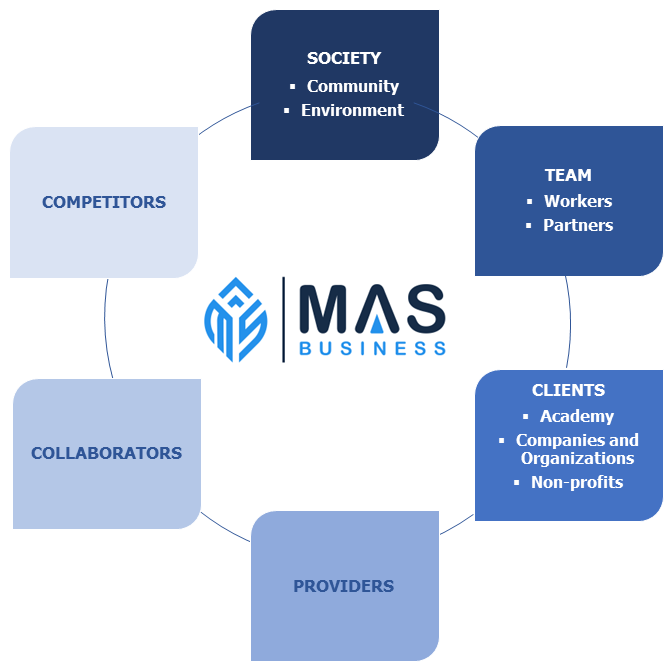Management approach

We contribute to Sustainable Development by providing value to our clients through our innovative services.
Taking Stakeholders’ concerns into account is fundamental to identify and understand relevant Sustainability issues. Organizations need to engage with their Stakeholders and make themselves fully accountable towards them.
All of our services are based on this premise and, for professional coherence, it is important for us to share this vision of Sustainability with our clients.
Furthermore, before making any commitment to a potential client, we make sure they share our vision of transparency and trust.
Since 2005, we have been committed to United Nations Global Compact initiatives in Spain and to its principles in the areas of human rights, labor, environment and anti-corruption.
In line with our policy of transparency and accountability, every year we draw up our Sustainability Report.
This document includes the most relevant activities carried out by our company in the three key ESG areas (Environment, Society, Governance) and it follows the latest edition of the GRI indicators.
Here you can find our Sustainability Reports (in Spanish):
- Sustainability Report 2023
- Sustainaiblity Report 2022
- Sustainability Report 2021
- Sustainability Report 2020
- Sustainability Report 2019
- Sustainability Report 2018
- Sustainability Report 2017
- Sustainability Report 2016
- Sustainability Report 2015
- Sustainability Report 2014
- Our Stakeholders, as identified in our 2014 Sustainability Report
- Sustainability Report 2013
- Sustainability Report 2012
- Sustainability Report 2011
- Sustainability Report 2010
In 2015, we obtained a certificate issued by the ‘Másfamilia Foundation’ that accredits the ‘efr microenterprise’ management model in work-life balance. It’s a third-party management tool, based on continuous improvement, which provides a simple and effective methodology to enable the development of effective work-life balance measures in companies.
At MAS Business, we aim to create a stimulating work environment, so that people can grow professionally and achieve their professional goals.
As stated in the Article 9 of our Code of Conduct (available, in Spanish, here), ”the activities of the Organization are carried out with full respect for the fundamental rights of all its members, based on accepted international laws and practices (such as: the Universal Declaration of Human Rights of the United Nations and the International Labor Organization and the UN Global Compact Principles)”.
We are committed to equal opportunity, respect for diversity and the principles of work-life balance.
In 2021, we carried out our fifth review: we were the first microenterprise to achieve the A+ level of excellence (the highest level awarded by the Másfamilia Foundation).
In 2023, we renewed the certification: with great pride and enthusiasm, we have maintained the A+ level of excellence.
Our Code of Conduct (available, in Spanish, here) is based on the values of MAS Business and it aims to promote a honest conduct in all the people who collaborate in our business project.
We search for the highest quality of our services, in order to create economic value compatible with environmental and social development.
We are very demanding in our quality policies.
Quality is at the heart of our business: we want to help our clients create value and improve their Sustainability performance.
We aim to deliver good products and services, adapted and applied to provide appropriate solutions. We are committed to constantly improving our services, people and processes.
Our Quality Management System is designed to ensure that we understand our customers’ needs (expressed or implied) and respond to them with a level of quality that meets their expectations.
We subject it to a process of review and continuous improvement based on the information provided by all the people involved in our project and, especially, based on the customer’s perception of the service provided.
We establish a set of procedures and define the structure of the organization and the responsibilities and criteria for resource allocation, in order to meet our customers’ expectations and improve the allocation of available resources.
We maintain good relations with our community, in strict compliance with the law.
We are committed to respecting our environment and promoting its preservation: we strive to reduce our consumption (of raw materials and energy) and our generation of waste.

For the review of compliance in reference to the Basic Principle of Inclusion, we have used the methodology proposed in the AA1000SES standard: “Stakeholder Engagement: Stakeholders relevant to the purpose and scope of the engagement should be identified. A methodology for identifying Stakeholders should be established.”
We have identified six Stakeholders (five of which are key to the company’s success) and have a very direct and interactive relationship with them. The sixth is society in general and (although our power of influence and interaction is minimal) we consider that we are contributing to a more sustainable and fairer world for all, through the application and dissemination of good practices in Sustainable Development.
The system used for the description and mapping has been based on trying to understand:
- The different existing groups, by reason of their specific characteristics.
- The impact that the Stakeholder Group can cause on the organization.
- The impact that the organization can cause on the Stakeholder Group
- The expectations of engagement, both from the point of view of the organization and of the GGIIs
- The geographic scale of operation
The system used for description and mapping has identified:
- The methods of engagement associated with each Stakeholder Group, taking into account their nature and degree of involvement.
- The people in charge of the organization who maintain relations with each of the Stakeholders.
- The stakeholders in each stakeholder group.
The development of our business in a responsible and sustainable manner is based on being loyal to our purpose and identifying the issues that are relevant for us (by taking into account the point of view of our Stakeholders and by carrying out a risk analysis).
According to the AA1000APS standard, a relevant issue is an issue that will influence the decisions, actions and performance of an organization or of its Stakeholders.
To review our degree of compliance with regard to the application of the ‘Materiality Principle’, we used the three-stage methodology proposed in AccountAbility’s ‘The materiality report’ (2006) and the documents published by GRI and EFRAG.
On a regular basis, we conduct a comprehensive review and analysis of the list of relevant issues and -if necessary- expand or reduce it.
As signatories of the United Nations Global Compact and members of its Spanish Network, we apply, promote and disseminate the ‘Ten Principles of the United Nations Global Compact’.
With respect to the tenth principle, we have used the ‘Practical guide for risk management in corruption matters’ (published by the Spanish Network of the United Nations Global Compact) for both the analysis and the implementation of our management model:
- Internal analysis. Both country risk and sector risk are considered low. No contracts were signed with any Public Bodies, so this factor of risk is also low. All payments are controlled and made from the head office.
- Policy. All MAS Business employees (as well as any party working on behalf of the organization) are prohibited from making, offering to make or promising to make payments (regardless of whether the payment is actually made). Likewise, they mustn’t give anything of value directly or indirectly to a third party (including any government official and/or professional) to assist MAS Business in obtaining or retaining an improper business advantage (whether or not a benefit is received in return).
- Actions. The policy is known to all employees and is communicated to third parties with whom a new relationship is to be established.
- Control systems. As a rule, we analyze in advance each of our dealings with third parties so as not to fall into any form of corruption or be indirectly involved in it. The Management Committee includes this matter in its periodic review, within the risk management system.
Our strategic development is based on four fundamental pillars, on which we deploy the objectives:
- Pillar 1: Managing a responsible and sustainable business.
- Pillar 2: Caring for people and their development.
- Pillar 3: Engaging with customers, providers and the community.
- Pillar 4: Minimizing environmental impact.
Our relevant issues are integrated into the corresponding pillars:
- Managing a responsible and sustainable business
- Ethics and integrity in our actions
- Strength and soundness of our project
- Information privacy and security
- Caring for people and their development
- Talent management
- Work-life balance
- Occupational health and safety
- Internal dialogue and work practices
- Commitment to clients, providers and the community
- Generating value for clients
- Responsible marketing
- Impacts on the community
- Responsible management of providers relationship
- Minimizing environmental impact
- Commitment: carbon neutrality
- Environmental management
After analyzing the fulfillment of the goals we set in the previous cycle and identifying new ones, we carry out a diagnostic to determine strategic actions to be deployed. We also cross-reference relevant issues and SDG targets (which we use to identify which targets we can impact and how they affect the generation of value in the five capitals).
Strategic actions are integrated into an ‘Action Plan’ that we follow for development, monitoring and control.
Our Annual Sustainability Report contains a chapter for each of our relevant topics, grouping them according to the three ESG axes (Environment, Society and Governance).

